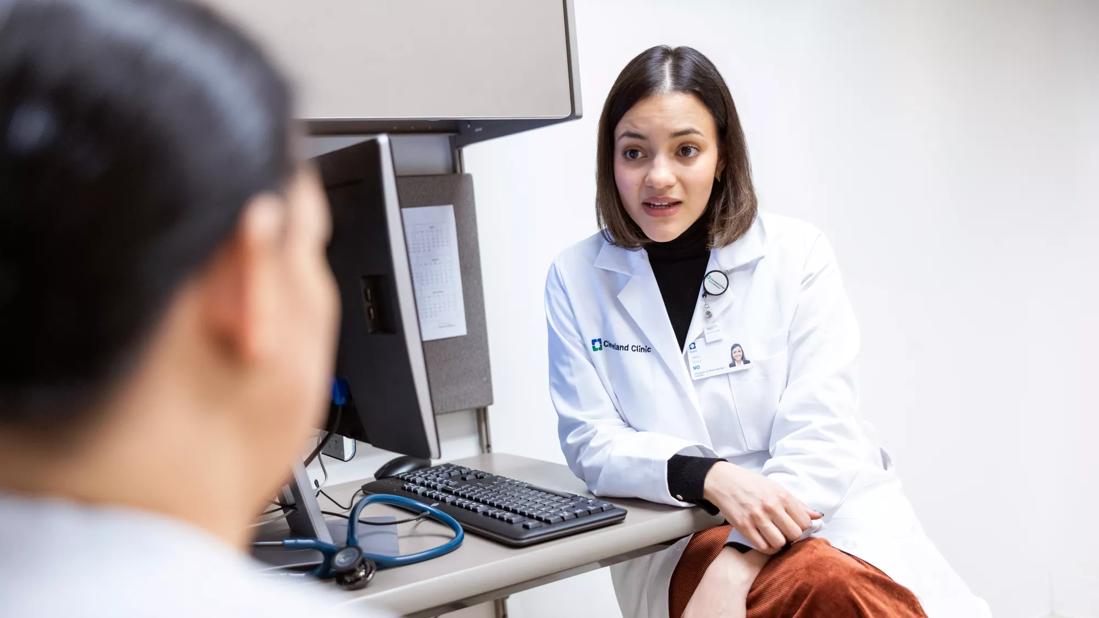New clinic meets Hispanic patients where they are

Image content: This image is available to view online.
View image online (https://assets.clevelandclinic.org/transform/5aa6a4d4-1a5f-4ced-ba92-3689dcc387e8/gonzalez-rheumetology-hispanic)
Rheumatologist treating patient in Hispanic clinic
When healthcare providers speak of the importance of “meeting patients where they are,” they often mean communicating with empathy and understanding about an individual’s mindset or emotional state. It can be just as crucial, however, to literally meet patients in their own neighborhoods, and to remove language and cultural barriers that can get in the way of the best care.
Advertisement
Cleveland Clinic is a non-profit academic medical center. Advertising on our site helps support our mission. We do not endorse non-Cleveland Clinic products or services. Policy
With that in mind, Cleveland Clinic rheumatologist Melany Gonzalez Orta, MD, now spends one day each week at the health system’s Lutheran Hospital, located in a West Side neighborhood that is home to higher percentages of Cleveland’s Hispanic and Latino communities. Starting in February 2024, Rheumatology joined other specialties – Internal Medicine, Urology, Female Incontinence, Psychiatry and Psychology, and Nephrology – at Lutheran’s Hispanic Clinic.
The purpose of the clinic is to meet the unique needs of the Hispanic community, both through physical proximity and by ensuring that patients can meet with Spanish-speaking staff and receive written information in Spanish.
Dr. Gonzalez became interested in providing such a service while she was doing her rheumatology fellowship at Cleveland Clinic’s main campus.
“One of the reasons why rheumatology is fascinating is that our diseases don't tend to be clear cut,” she says. “Getting a detailed history is key to build a differential diagnosis. Testing can be confusing for patients to interpret, and treatment can be challenging to navigate. Hispanic populations rely on multiple idioms, depending on the country of origin, to communicate.”
Even with excellent interpreters, sometimes patients can struggle to communicate about the nuances of symptoms and care.
As a clinician who speaks Spanish, Dr. Gonzalez often saw the Spanish-speaking patients.
“I noticed some patients who were not very compliant with recommendations made by other providers,” she says. “When I started talking to them, it became clear it didn't have to do anything with the providers themselves. It was that the patients felt that they couldn't really express themselves fully. So that sometimes resulted in not following through, or in non-adherence to medications.”
Advertisement
In addition to communication barriers, traveling to appointments across town also was complicated for patients from lower-income households, who often have to rely on public transportation.
Reducing barriers around medical visits can make a substantial difference in the patient experience.
“For a Spanish-speaking person going into Lutheran, it is like another world. Every corner has a Spanish-speaking provider, so you feel part of that community,” says Dr. Gonzalez. “That encourages patients to actually go to their appointments because they don't find barriers. If they have to leave the exam room to get labs or X-rays, they’ll still find staff members who speak Spanish. And when I see Spanish-speaking patients, I make sure discharge instructions are in Spanish and all communications in my chart are also in Spanish.”
Statistics on incidence of rheumatic illness among Spanish-speaking populations are in short supply.
One of her goals is to learn more about the prevalence of rheumatic diseases in the Hispanic population, she says.
The first steps necessary to starting the rheumatology clinic at Lutheran Hospital included carving out space and putting the scheduling apparatus in place. Now patients with rheumatologic issues are offered an appointment there, regardless of whether they speak Spanish.
Promotional efforts include updating Dr. Gonzalez’s biographical information and publishing news of the clinic in a Spanish-language newspaper in Cleveland.
The question of how to measure success will evolve as use of the clinic evolves.
Advertisement
“I will consider it successful if I am able to help the Hispanic population feel better managing their chronic rheumatic diseases without a language barrier,” she says. “We hope this results in increased treatment adherence and fewer disease flareups and complications.”
Advertisement
Advertisement
Fellows will train under faculty with broad range of expertise
Collaboration was key to identifying source of nerve condition
When to suspect concurrent giant cell arteritis
New research explores the role of immune cell and blood-brain barrier changes
Significant advances had a direct impact on clinical practice
Adam Brown, MD, shares his passion for solving rheumatologic mysteries
Making a difference by putting empathy into action
Structured interventions enhance sleep, safety and caregiver resiliency in high-acuity units